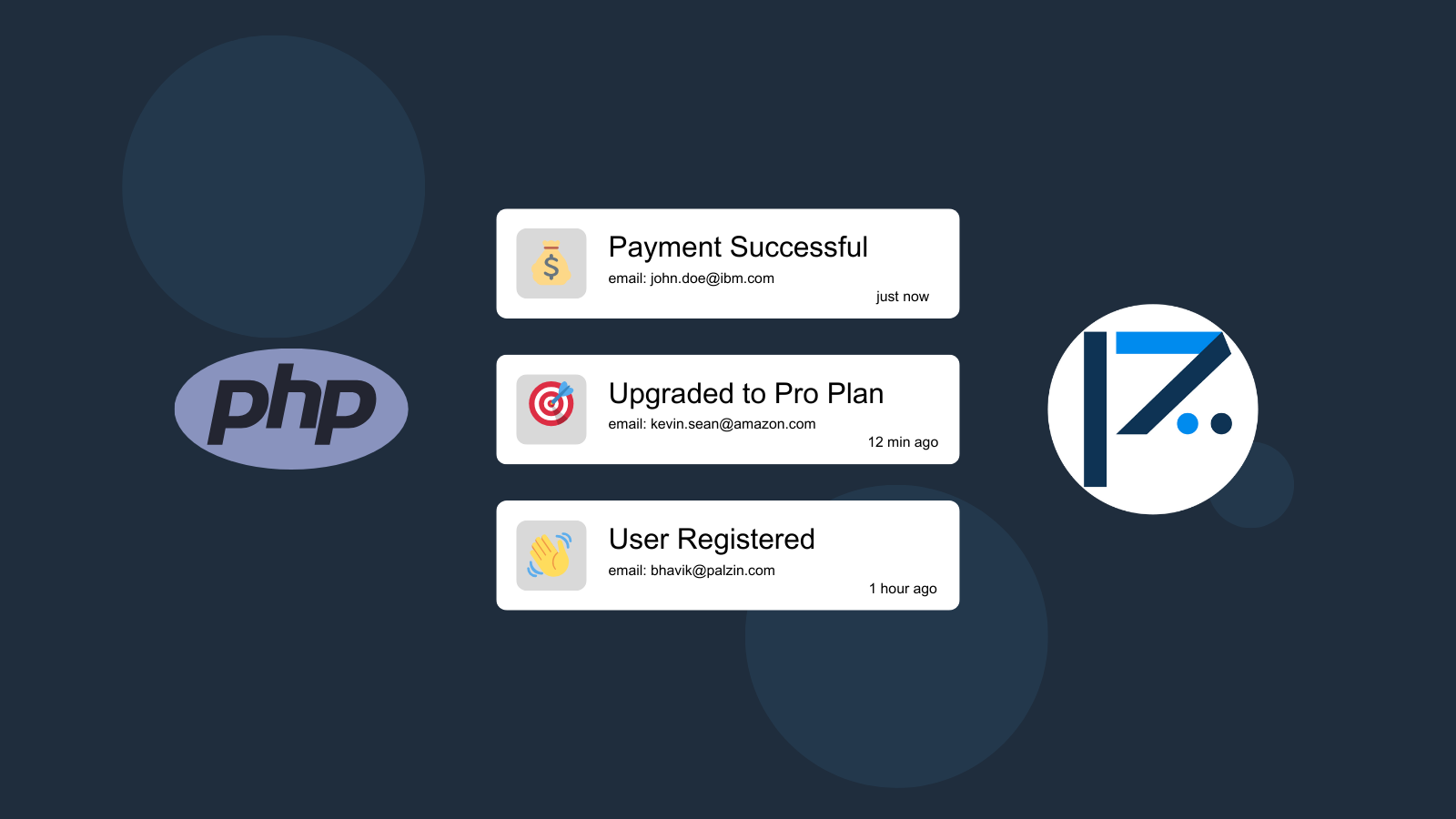
Postgres, a reliable relational database frequently utilized in Php applications for data persistence and retrieval, offers a wide array of features, rendering it a suitable choice for both small and large-scale applications.
Nonetheless, like any other database system, Postgres is vulnerable to downtime triggered by various factors. Possible causes include hardware failures, network issues, misconfigurations, and more. When such incidents occur, it can disrupt the expected functionality of your application, leading to issues like failed requests and sluggish performance, and in severe cases, data loss.
Hence, it is imperative to maintain vigilant monitoring of your database's status and swiftly address any irregularities. Thankfully, Palzin Track simplifies the process of tracking critical events like database downtime and failures. Palzin Track serves as a user-friendly yet potent event tracking tool, designed to log unexpected application behaviors.
For instance, in the context of Postgres, it's common practice to establish periodic checks to ensure the database's operational status, monitoring its performance, disk usage, and memory utilization. Whenever anomalies surface, such as elevated disk usage, performance degradation, or downtime, Palzin Track records these events, immediately notifying your team for prompt action.
Moreover, Palzin Track offers a robust insights dashboard, enabling you to monitor various aspects of your database, including its status, performance, uptime, memory usage, and other customizable metrics. This feature simplifies the task of maintaining your database's overall health and ensures seamless Php application operation. Connect Palzin Track to PHP
To track your Postgres downtime, you can use the following code snippet Please don't forget to replace the YOUR_API_TOKEN with your API token and update the project and channel names.
Using PHP with cURL
<?php
$curl = curl_init();
curl_setopt_array($curl, array(
CURLOPT_URL => 'https://api.palzin.live/v1/log',
CURLOPT_RETURNTRANSFER => true,
CURLOPT_ENCODING => '',
CURLOPT_MAXREDIRS => 10,
CURLOPT_TIMEOUT => 0,
CURLOPT_FOLLOWLOCATION => true,
CURLOPT_HTTP_VERSION => CURL_HTTP_VERSION_1_1,
CURLOPT_CUSTOMREQUEST => 'POST',
CURLOPT_POSTFIELDS =>'{"project":"my-project","channel":"status","event":"Postgres is down","description":"Postgres has been down for the last 5 minutes","icon":"🚨","notify":true}',
CURLOPT_HTTPHEADER => array(
'Content-Type: application/json',
'Authorization: Bearer YOUR_API_TOKEN'
),
));
$response = curl_exec($curl);
curl_close($curl);
echo $response;
Using PHP with Guzzle
<?php
$client = new Client();
$headers = \[
'Content-Type' => 'application/json',
'Authorization' => 'Bearer YOUR_API_TOKEN'
\];
$body = '{
"project": "my-project",
"channel": "status",
"event": "Postgres is down",
"description": "Postgres has been down for the last 5 minutes",
"icon": "🚨",
"notify": true
}';
$request = new Request('POST', 'https://api.palzin.live/v1/log', $headers, $body);
$res = $client->sendAsync($request)->wait();
echo $res->getBody();
Using PHP with HTTP_Request2
<?php
require_once 'HTTP/Request2.php';
$request = new HTTP_Request2();
$request->setUrl('https://api.palzin.live/v1/log');
$request->setMethod(HTTP_Request2::METHOD_POST);
$request->setConfig(array(
'follow_redirects' => TRUE
));
$request->setHeader(array(
'Content-Type' => 'application/json',
'Authorization' => 'Bearer YOUR_API_TOKEN'
));
$request->setBody('{"project":"my-project","channel":"status","event":"Postgres is down","description":"Postgres has been down for the last 5 minutes","icon":"🚨","notify":true}');
try {
$response = $request->send();
if ($response->getStatus() == 200) {
echo $response->getBody();
}
else {
echo 'Unexpected HTTP status: ' . $response->getStatus() . ' ' .
$response->getReasonPhrase();
}
}
catch(HTTP_Request2_Exception $e) {
echo 'Error: ' . $e->getMessage();
}
Using PHP with pecl_http
<?php
$client = new http\Client;
$request = new http\Client\Request;
$request->setRequestUrl('https://api.palzin.live/v1/log');
$request->setRequestMethod('POST');
$body = new http\Message\Body;
$body->append('{"project":"my-project","channel":"status","event":"Postgres is down","description":"Postgres has been down for the last 5 minutes","icon":"🚨","notify":true}');
$request->setBody($body);
$request->setOptions(array());
$request->setHeaders(array(
'Content-Type' => 'application/json',
'Authorization' => 'Bearer YOUR_API_TOKEN'
));
$client->enqueue($request)->send();
$response = $client->getResponse();
echo $response->getBody();
In addition, Palzin Track provides several powerful features, such as real-time event tracking, push notifications, charts, funnels, and user journey tracking. Furthermore, it works seamlessly with PHP and is an excellent tool for monitoring each application part.
Palzin Track provides a generous free plan to get you started with event tracking. You can also check out our pricing page to see our paid plans. So please give us a try and let us know what you think!
Palzin Track reveals the human stories behind your data. Make user-centric decisions that drive growth.